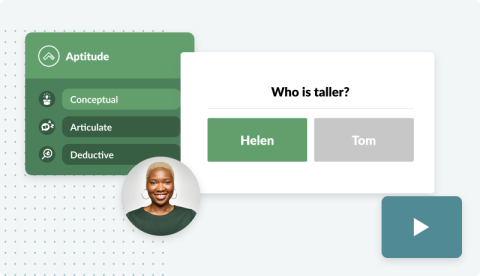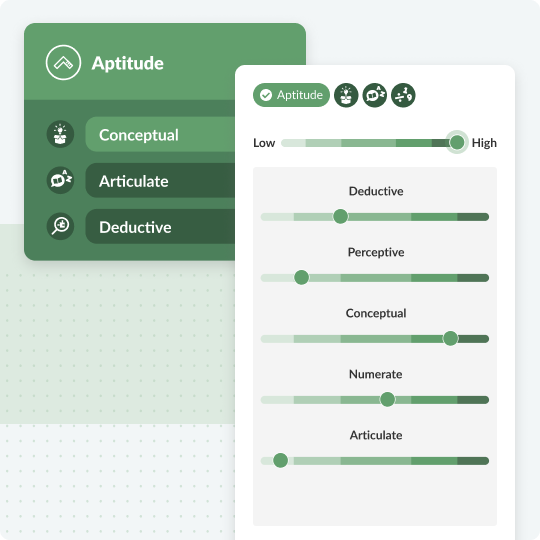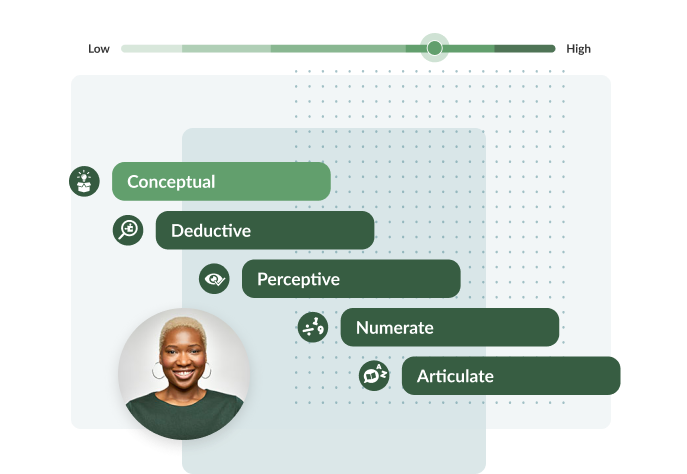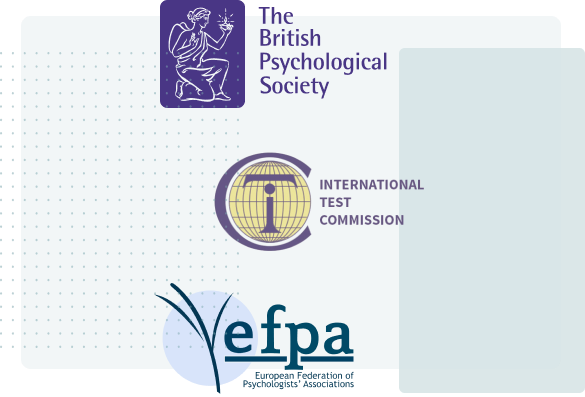General Intelligence Assessment (GIA)
The most accurate way to predict a successful hire
- Predict success in a role
- Recruit candidates who adapt & learn quickly
- Create high performing teams
- Keep your team engaged and inspired in their roles
- Identify future high-performers


What our happy customers say
The General Intelligence Assessment (GIA)
The most accurate predictor of job success is looking at aptitude. Measuring aptitude in our platform will show who will perform best in a role, allowing you to build high-performing teams and improve business performance.


Why use the General Intelligence Assessment (GIA)?
Measuring aptitude helps predict a candidate's success in a role. You’ll see how quickly they’ll grasp the skills needed, how they solve problems and the speed in which they learn.
These insights make it easier to select the right candidate, as you’re able to focus on each person’s ability, which is the best predictor of performance in a role as proven by research conducted by the American Psychology Association. When you combine aptitude results with their personality and behaviour, you’ll have a higher chance of finding your next top performer.
How the General Intelligence Assessment (GIA) works
Our GIA assessment measures aptitude in 5 areas:
5 Online Assessments
The Thomas GIA consists of 5 online tests, including reasoning, perceptual speed, number speed and accuracy, word meaning and spatial visualisation.
Understand their speed
Gain insights on their mental capacity and how quickly they can learn a new role.
Understand General Intelligence
The overall percentile is an estimate of a candidate’s general intelligence, focussing on their response to training, mental processing speed, concentration and fast track potential.

Assessment Information
- Assessment type: Aptitude
- Format: 5 assessments
- Time to complete: 30-45 minutes
- Training required: None
Validation:
We’re registered with the British Psychological Society and audited against technical criteria established by the European Federation of Psychologists’ Associations. This means our platform is built from science you can trust
Read a sample candidate profile to see Thomas in action

We simply would not be where we are today without the GIA from Thomas. The feedback that these assessments provide is invaluable.

The theory
The GIA was developed by Dr Peter Dann at the University of Plymouth.
The assessment looks at an individual's speed of processing information and ability to learn and develop new skills. Our aptitude assessment can be used for recruitment, retention, development, management, identifying training needs, career guidance, succession planning and benchmarking.
Get our factsheet to learn how the Aptitude assessment can help you better understand the learning speed and trainability of your people

Format
Our aptitude assessment consists of five tests of measuring cognitive abilities including thought, language, decision making, learning and memory.
Each test has one type of task, and all the questions are an equal level of difficulty. Your score is calculated by the speed and accuracy of your responses and compared to a sample population (the norm group) to determine whether your scores are lower, higher or in-line with the majority of that population.
Each of the five tests measures a specific cognitive function:
Reasoning
Assesses your ability to make inferences, reason from information provided and draw correct conclusions. It also measures your ability to hold information in short-term memory and problem solve.
Perceptual Speed
Assesses your ability to spot errors, ignore irrelevant information and recognise similarities and differences. You’ll be tested on your speed of semantic encoding and comparison.
Number Speed and Accuracy
Assesses your numerical reasoning ability and numerical manipulation. The test measures how comfortable you are working with quantitative concepts.
Word Meaning
Assesses your word knowledge and vocabulary by looking at words from different parts of speech and your ability to identify words that have similar or opposite meanings. The test measures your ability to understand or written or spoken instruction.
Spatial Visualisation
Assesses your ability to create and manipulate mental images of objects. The test measures your ability to work in environments where visualisation skills are required by looking at your mechanical reasoning and ability to use mental visualisation to compare shapes.

Reliability & validity
The GIA has undergone rigorous scientific testing to determine its reliability and validity as a psychological assessment.
The GIA is registered with the British Psychological Society (BPS) after it was audited against the technical criteria established by the European Standing Committee on Tests and Testing, part of the European Federation of Psychologists' Associations.
Frequently Asked Questions
<h6 id>What is the General Intelligence Assessment (GIA)? </h6 id>
The General Intelligence Assessment (GIA) is an aptitude and ability test (or perceptual speed test) that helps employers predict how quickly an individual will adapt to a new role or regime.
<h6 id>How does the GIA work?</h6 id>
The GIA is composed of online tests that measure an individual’s cognitive function in five areas: Reasoning, Perceptual Speed, Number Speed & Accuracy, Word Meaning and Spatial Visualisation.
Their score is determined by the speed and accuracy of their responses and then compared to a norm group to determine whether the scores are lower, higher or in-line with the majority of that population.
<h6 id>What are the benefits of the GIA to an organisation?</h6 id>
The GIA report gives you an estimate of an individual’s general intelligence and gives insights into their response to training, mental processing speed, concentration and fast track potential.
As a result, the GIA can help you answer questions about your workforce including, ‘Can your people think on their feet?’, ‘Can they cope with the mental demands of the job?’, ‘Are they good problem solvers?’ and ‘How quickly they can they learn?’.



